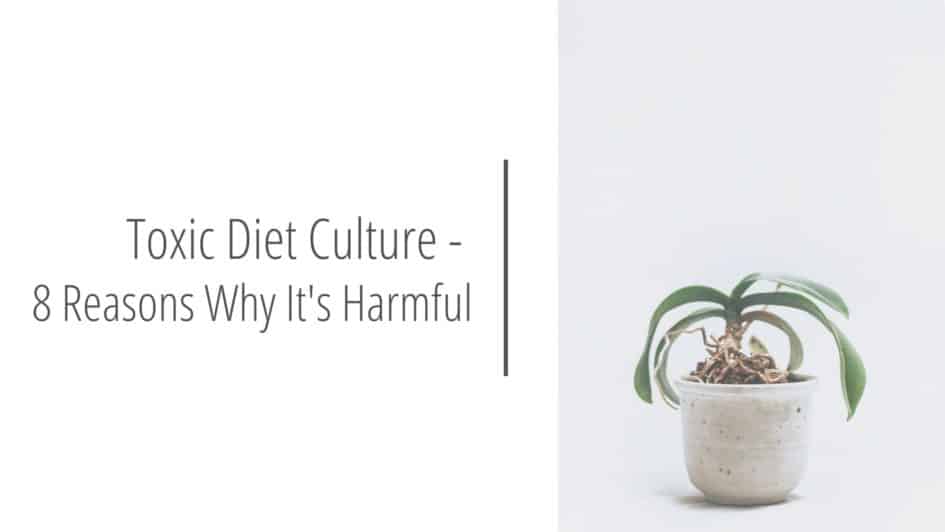Table of Contents
What is Diet Culture?
Before we can dive into the toxic diet culture and 8 reasons it’s harmful, let’s first talk about what exactly diet culture is. Several people have defined diet culture but Christy Harrison, a registered dietitian who specializes in intuitive eating and dismantling diet culture, crafted a great definition (1).
In short, diet culture praises the “ideal body” which is seen as small and thin. According to society, possessing this type of body means you have additional health and value. In order to achieve this “ideal body,” diet culture encourages weight loss via restrictive behaviors that encourage disordered eating.
If you do not fall within the “ideal body” category and/or are not taking action to lose weight in order to achieve the “ideal body,” then diet culture makes you feel ashamed and worthless.
8 Reasons Why Diet Culture is Toxic
1. Diet culture tells you that you aren’t good enough.
Ouch. Not good enough? That really hurts. Sadly, it’s true. Diet culture feeds you lies that say you aren’t good enough. In order to reach diet culture’s standards, you have to constantly pursue weight loss, shrink your waist, have a thigh gap, be toned (but not too toned), wear a certain pant size, and the list goes on.
Diet culture tries so hard to push everyone into a box that’s the same shape and size but that’s just not how bodies work.
2. The practices are not sustainable and never will be.
When I say “practices” of diet culture, I’m talking about following fad diets, exercising excessively, counting calories, restricting certain foods, etc.
If you restrict certain food groups and cut out certain nutrients, there is going to come to a point where you can no longer resist the urge and will give into temptation (i.e. resist a slice of your favorite cake or turn down a plate of delicious pasta).
If you commit to 5 am workouts 6 days/week every week, you are going to eventually burn out from exhaustion. A strong will can go a long way but life always happens and things don’t turn out the way we originally planned.
Thankfully, there are better and more sustainable ways to approach health than what diet culture preaches.
3. Following diet culture doesn’t set a great example for those that look up to you.
How does following the rules of diet culture affect the people around you, especially those who look up to you for guidance and wisdom? Here are some examples:
- Older sister: what do your siblings think when you criticize your body in the mirror?
- Mom: what does your daughter think when you tell her she needs to cut back on the sweets?
- Friend: what do your friends think when you jump from diet to diet?
Those that look up to someone will observe their actions and then follow along. If someone you influence (whether that’s intentional or not) sees you cutting out carbohydrates and verbalizing that you need to lose weight, odds are they will probably start to think those thoughts too.
I like to think about it this way: Who do you wish you had as a role model when you were younger? Someone believing the lies of diet culture or someone expressing confidence in themselves and their worth?
Let’s make a point to be great examples to those that look up to us!
4. Diet culture chooses your priorities in life.
Have you ever felt like dieting chooses what you prioritize? Here are some common examples of when dieting can get in the way:
- Leaving home in the mornings at 5 am to work out makes you miss breakfast with your family or your spouse.
- Coming home late from work because you went straight to the gym, makes you miss dinner with your family, get-togethers with friends, your son’s soccer game, or maybe even quiet time with your spouse.
- Restricting a food group makes you miss out on your favorite cake that someone hand-made you for your birthday.
- Counting calories forces you to skip a friend’s going away party due to fear of giving in to temptation during the meal.
If you have fallen victim to diet culture then I’m sure you can name an event or area that you feel like you missed out on in life. I know I can.
Do you want diet culture to have that much control over your life? Diet culture truly is toxic, but we can learn how to fight it.
5. Toxic diet culture is designed by wealthy people for wealthy people
Have you ever noticed how many weight loss supplements are available? What about exercise programs that result in weight loss? Or weight loss cookbooks? Or weight loss products such as body wraps and waist trainers?
These weight loss “solutions” are not always cheap or affordable. Now, have you noticed who supports and advertises these products? Typically, we see celebrities and social media influencers selling these types of products. But why?
One, because they influence people’s decisions. Two, because they get PAID. Kylie Jenner gets paid over $1,000,000 to endorse a product on Instagram to her millions of followers (2). So when she endorses a detox tea, I can only imagine the number of people she influences to buy that product.
Celebrities, like Kylie Jenner, and others in the spotlight are often praised for their “perfect” bodies. This results in people attempting to achieve that body, no matter the cost. But quite a few people don’t understand that these “perfect’ bodies are a result of tremendous wealth.
Most celebrities have cosmetic work done on a regular basis. Whether it is lip injections, hip injections, liposuction, breast implants, butt implants, or waist reduction surgery… the list goes on.
Not only this, but celebrities can afford private chefs, personal trainers, and in-home gyms. These luxuries make it a lot easier to achieve the “ideal body” that so many people desire.
Now, I am not at all attempting to talk down on the wealthy people of the world. I am simply pointing out the rich have access to things that help them achieve the “ideal body” that diet culture preaches. The average American can’t afford this lifestyle.
6. Dieting often leads to disordered eating.
It is common for dieting to lead to disordered eating habits. According to the Academy of Nutrition and Dietetics, disordered eating is a term “used to describe a range of irregular eating behaviors that may or may not warrant a diagnosis of a specific eating disorder (3).”
Examples of disordered eating
- Calorie counting
- “Good food” versus “bad food”
- No food after 7 pm
- Fasting at least 12 hours between dinner and breakfast
- “Cheat foods”
- No “white” foods
- Skipping meals
- Cutting out food groups
Once these rules are created, people obsess over following them. This leads to disordered eating habits. If left alone, these habits can quickly lead to an eating disorder. From my experience, that is not a pleasant road to go down.
7. Dieting goes against what our bodies naturally strive to achieve.
Set-Point Theory
Did you know that research shows that the body has a weight set-point it likes to naturally be at? This is called the set-point theory.
This theory states that bodies have a weight range they optimally function at and will fight to maintain. It is estimated that our set point can fluctuate between 10 to 20 pounds (4). Our set-points are determined by our genetics, just like our hair and eye color.
An excellent example of this is weight cycling. When people successfully lose weight through dieting, they manage to keep the weight off for a period of time. However, as people transition back to a more sustainable way of living (i.e. no longer dieting) their weight normalizes back to their set-point weight.
This phenomenon is natural and is the body taking care of itself. However, since toxic diet culture is harmful and highly profitable, it conveniently doesn’t talk about set-point theory.
8. Diet culture teaches that happiness is achieved through appearance
Oh, what a lie! I believed this for so long. It seems that we are searching our entire lives for what makes us truly happy. And for some reason, we almost always land on the number the scale shows or the image the mirror reflects.
But does achieving our goal weight or having a perfectly flat stomach really make us happy? I don’t think so. It might act as a bandaid for what’s really going on in our life but sooner or later that bandaid is going to be ripped off and we are again left searching for what makes us happy.
I don’t know about you… but I am sick of that cycle. It’s time to stop basing our worth and happiness on our appearance.
How do we stand up to toxic diet culture?
Check out my anti-diet themed store! It’s full of fun products that spread the anti-diet message. You can also read my posts about Intuitive Eating, Health at Every Size, and body positivity.
Thanks for reading!
Rachel Beiler, MHS, RD, LDN


August 28, 2019 at 7:15 pm
You make some good points! I think if we make food choices based on what builds health and avoid foods that are detrimental to our health, our body will adjust to our ideal weight. What do you think about that?
August 29, 2019 at 10:48 am
If we truly want to leave diet culture behind and pursue our health (for example, our set-point weight), I think we need to focus on finding a balance between all foods and avoid labeling foods as “good” or “bad.” That way, we can develop a healthy relationship with all foods and be able to enjoy them within a balanced diet, free from restrictive behaviors.
August 27, 2019 at 1:38 am
Thank you! ❤️
August 27, 2019 at 1:38 am
Thank you!